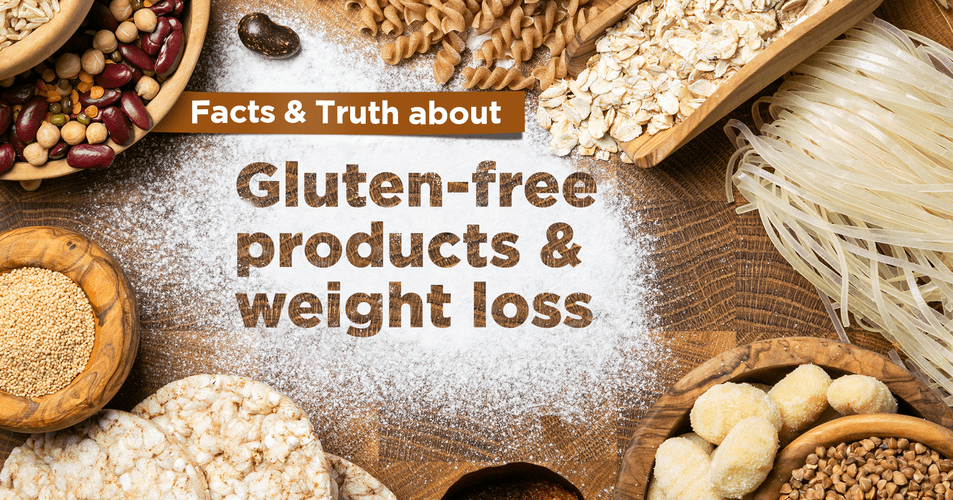
Facts & Truth About Gluten-Free Products & Weight Loss
Facts & Truth About Gluten-Free Products & Weight Loss

Over the past couple of years, there has been a significant rise in the number of celebrities and also health bloggers promoting the incorporation of a gluten-free diet plan for the purpose of reducing weight. People who claim this fact say that gluten free products improve digestion and even enhance energy levels, but does science support such testimonials?
Gluten is a kind of protein usually found in grains like barley and wheat. It has the potential to inflame and cause damage to the intestines of those with celiac disease. For people with non-celiac gluten sensitivity, symptoms like bloating, diarrhea and gas are common. Opting for a gluten-free diet is the only remedy to tackle these conditions. But for the major portion of the population, no risk arises from gluten and hence there’s no need to avoid it.
The researchers at The Journal of Pediatrics have shown that nearly one third of Americans are reducing their gluten intake, even when celiac rates are being maintained at a stable point over time. However, there is no exact confirmation that organic food products that are gluten-free provide any considerable health benefits to those who face problems with digesting gluten. Irrespective of many health benefit claims, gluten-free healthy snacks or gluten free flours have not yet shown any proper stats that they minimise the risk of type 2 diabetes and heart diseases.
HOW IS A GLUTEN-FREE DIET EFFECTIVE?
A diet that is gluten-free terminates all kinds of food items containing gluten. The Celiac Disease Foundation says, the prime sources of gluten is contained in grains like wheat, barley, rye, triticale and also cross-contaminated oats, as well as their certain derivatives – malt, wheat starch and brewer’s yeast. So, people who already suffer from celiac disease or are sensitive to gluten should avoid certain common foods like pasta, bread, noodles, breakfast cereals, baked goods, and also beer.
Gluten is also frequently found in various sauces and condiments, specifically in soy sauce or malt vinegar. In addition, food manufacturers employ it as an ingredient for food additives or fillers. When it is used in such commodities, it is mentioned as maltodextrin or wheat starch on the product labels.
DOES A CONNECTION BETWEEN GLUTEN AND WEIGHT LOSS EXIST?
Genuine gluten-free products or alternatives are generally quite pricey and are also hard to acquire. Hence, any regular gluten-free diet typically consists of natural whole foods devoid of gluten, that includes fruits, veggies, and also gluten-free flours and grains like brown rice, millet and quinoa. Putting aside foods that have high carbohydrate content and switching them with marginally processed, fiber-rich foods can actually help to assist in weight loss and promote a feeling of well-being.
Anecdotal evidence from specialists who are into clinical practice suggests that celiac patients who shift to a gluten-free diet might actually find it quite effortless to lose weight. Even after all such scenarios, there is no true and strong evidence that gluten contributes to increase in weight, or creates any barrier in the process of weight loss.
Let’s have a detailed look at what science has to say about gluten-free organic food products meant for weight loss. Scientific studies have shown mixed results. Various papers have illustrated that opting for foods without gluten can actually aid in weight gain. According to a research study issued in the Alimentary Pharmacology and Therapeutics journal, a gluten-free diet plan caused 15.8% of patients with celiac disease to shift from a nominal or low BMI into an BMI class that signifies overweight, while 22% of patients who were already overweight gained even more weight. A similar research study from The American Journal of Gastroenterology revealed that 81% of Celiac patients experienced weight gain almost after two years of maintaining a gluten-free diet. Wholistic You sourcing organic food products form the brands cerified by PAN India.
At that same timeframe, scientists from the Journal of Clinical Gastroenterology and the European Journal of Internal Medicine came to know that eliminating gluten from the regular diet actually had a positive effect on BMI, both for the obese and the underweight individuals alike. An animal study conducted in 2013 showed that a gluten-free diet could increase the ability of fat burning, together with reduction in insulin resistance and inflammation inside of fat tissues. But, human studies are still required to confirm such findings.
What could be the prime reason behind such humongous differences? Numerous scientists have noted that at the diagnosis stages, most celiac patients were found to be overweight who did not have a proper understanding of a healthy nutrition plan.
Contrary to what many believe, switching to a ‘gluten-free life’ does not automatically unlock the secrets of losing weight. It all boils down to understanding one’s own body, existing conditions (if any), following a healthy lifestyle, and adhering to a balanced diet, to stay fit & active.



 Free Shipping on Order above ₹499/-
Free Shipping on Order above ₹499/- 